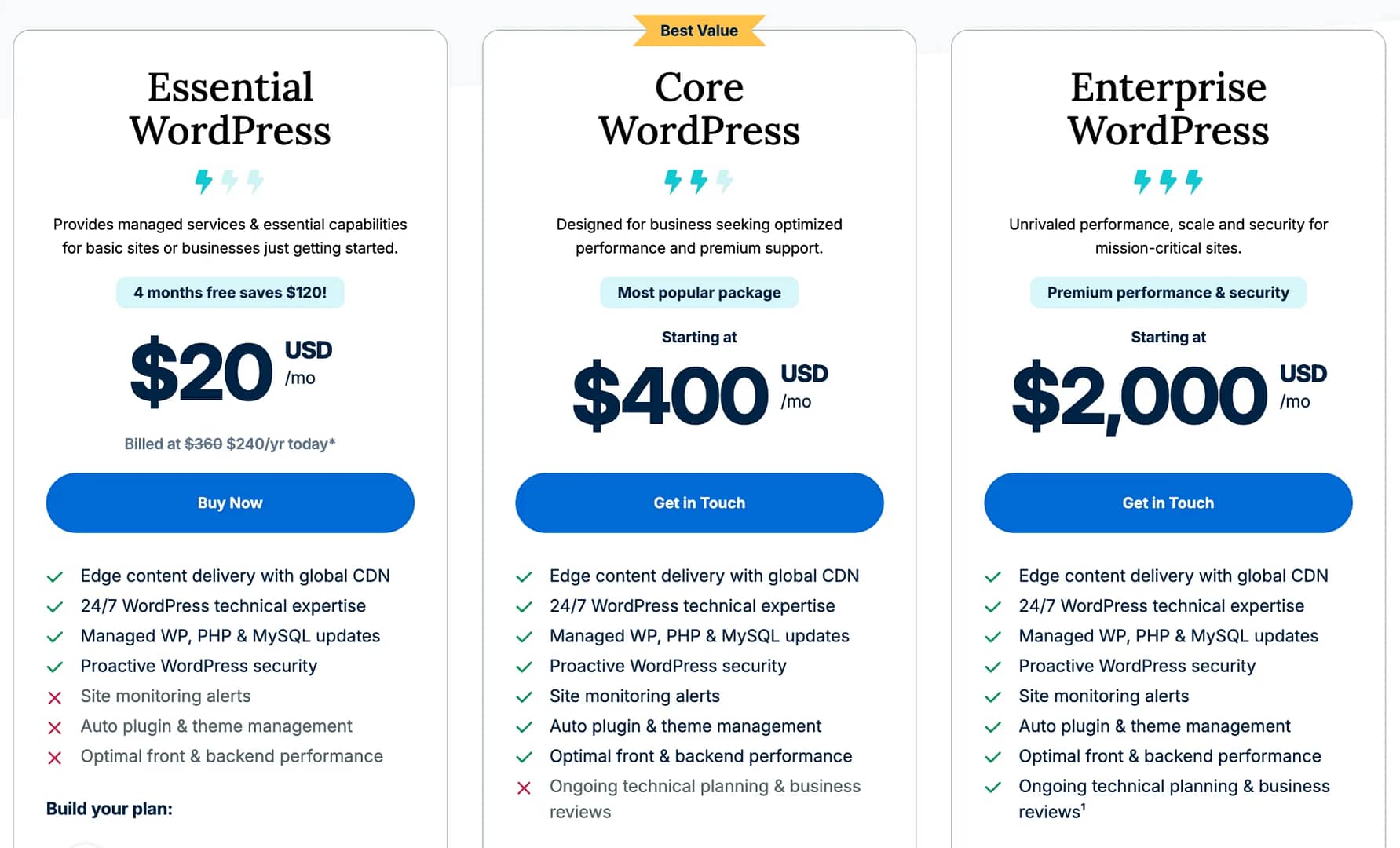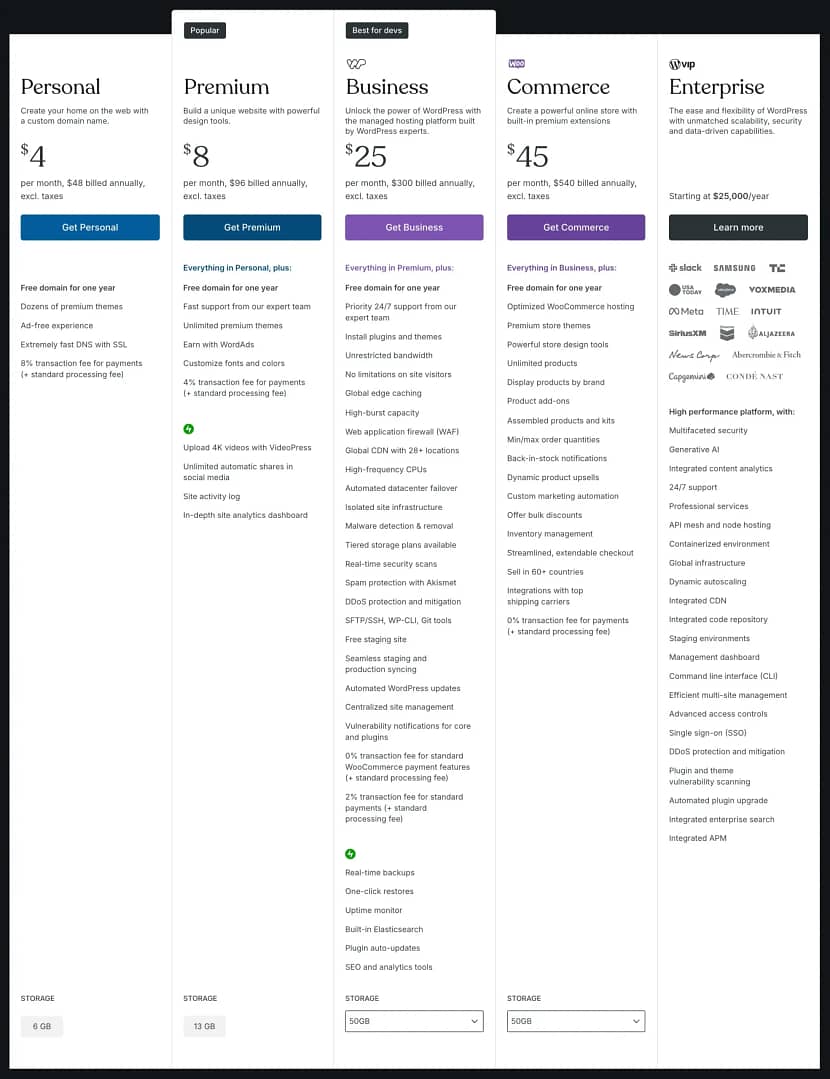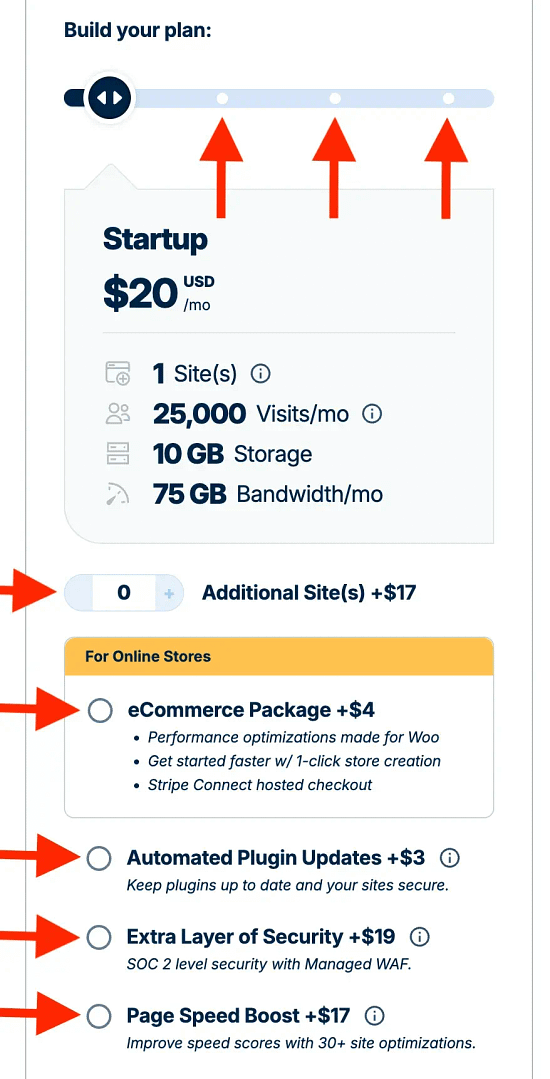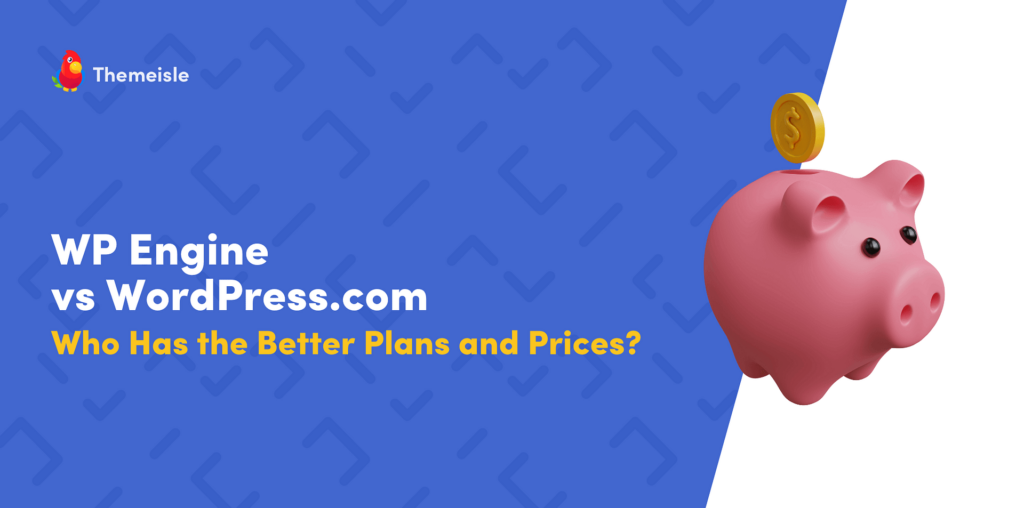Sometimes fate works in mysterious ways. I originally began writing this article the day before WordPress founder Matt Mullenweg took the stage in Portland, Oregon to deliver his keynote speech at WordCamp U.S.
Little did I know, less than 24 hours after I began typing, that my lil’ ol’ comparison of WP Engine vs WordPress.com would rapidly get overshadowed by the now very-trending story of WP Engine VERSUS WordPress. 😅
Well, I decided that I’m still going to share my original comparison with you because the inherent value of it hasn’t changed – even if current events might temporarily be drowning it out.
The fact remains: both WP Engine and WordPress.com are two very popular WordPress-only hosting providers. Many people who want to build their site using WordPress end up narrowing down their decision to these two, but then get stuck on the final decision.
And I don’t blame them.
At first glance, their plans and pricing structures couldn’t be any more different. I’ve written quite a few hosting company comparisons and I’m not sure that any of them have been more confusing than this one.
But don’t worry. That’s the whole reason I wrote this. I’m going to make sense of it for you and explain it in a way that will allow you to understand what exactly you’re getting with each host (and what it’ll cost you).
Let’s do this! 💪
A primer on the plans 🤼
When you first land on the WP Engine plans and pricing page, it appears they have three plans, whereas WordPress.com has five plans (and a sixth 100% free plan – though this is more of a “try it out” option than a serious plan):




This might give you the impression that WP Engine’s plans are simpler to browse through – since there are only three of them.
In actuality, this couldn’t be further from the truth.
Take a look at the screenshot under the “Build your plan” section to understand why I say that.
As you can see, their main plan has four different variations to it!
Plus there’s an option to add on an extra site (for $17 per site), and four optional add-on features (which all cost extra). 🤯
Tweaking any of these variables will result in a different final price.


If you do the math, there are 64 possible variations (and that’s excluding any additional sites added onto any variation). As you can imagine and as I mentioned in the introduction, this makes it challenging to do an apples-to-apples comparison with WordPress.com.
On top of that, they have an entire lineup of WooCommerce plans as well.
This doesn’t mean we can’t make any kind of comparison at all. But we do need to make it practical. The easiest way to do that is by disqualifying some things.
So here is what we will NOT compare:
- WP Engine’s $400-a-month plan. It has no equivalent on the WordPress side to compare it to.
- The highest level plans offered by both. These are enterprise level plans aimed at large companies with big budgets. WP Engine’s costs $24,000 per year, while WordPress.com’s is $25,000.
- The WP Engine WooCommerce plans to any of the WordPress.com plans. The WooCommerce plans are similar to their (WP Engine) WordPress counterparts, but with the obvious caveat that they come with ecommerce features. They also cost more.
That leaves us with the first four tiers of WordPress.com and the four variations of WP Engine’s main plan.
My quick recommendations ⏲️
You can check out the side-by-side comparisons for yourself in the next section below. Otherwise, if you just want some quick recommendations, here is what I suggest:
Choose WP Engine if you…
- Have more money to spend and you actually need the features that WP Engine provides for the additional cost.
- Prefer superior customer service and especially the ability to talk to someone on the phone (which comes with all plans above the base-level).
- Have an “important” website that you rely on for income or it represents a professional organization that you’re in charge of.
- Want the ability to piecemeal the features of your plan in a similar way to how airline tickets are purchased nowadays (where you pick what you want and pay extra for it).
- Don’t mind not being able to access page and post revisions. This was actually one of Matt Mullenweg’s first criticisms that he dished out against WP Engine in his initial scathing blog post.
Choose WordPress.com if you…
- Have never built a website before or have never specifically used WordPress to do it. You can take advantage of WordPress.com’s free plan to get familiar with the platform, how things work, etc.
- Don’t mind relying on community support for help and you don’t need to talk to anyone on the phone. Higher plans offer customer support but only via chat and email. The free and entry-level plans leave you with an AI chatbot.
- Have a hobby site or are just starting out and don’t need things like a staging site (which WordPress doesn’t give you until the third-tier plan).
- Don’t care that you won’t be able to download and install themes and plugins from the WordPress repository unless you opt for the pricier third-tier plan. This was a counterpoint to Matt’s revisions criticism that was raised by many people online. He responded to it by stating that WordPress.com can’t afford to offer access to themes and plugins on their lower tiers. 🤔
As you saw above, one thing that both companies have in common is that they limit your use of WordPress – each in their own unique way. However, their commonalities aren’t all negative. For instance, all plans with both companies offer a free global CDN and a free SSL certificate.
Aside from that, here is what the eight plans look like when arranged in ascending order by price:
| WP.com Personal | WP.com Premium | WPE Startup | WP.com Business | WPE Professional | WP.com Commerce | WPE Growth | WPE Scale | |
|---|---|---|---|---|---|---|---|---|
| Price per month (annual plan) | ||||||||
| Number of sites | 1 | 1 | 1 | 1 | ||||
| Free domain name | ❌ | ❌ | ❌ | ❌ | ||||
| Storage | 6 GB | 13 GB | 10 GB | 15 GB | 20 GB | 50 GB | ||
| ❌ | ❌ | ✅ | ✅ | ✅ | ✅ | ✅ | ✅ | |
| Website backups | ❌ | ❌ | Real-time backups | Real-time backups | ||||
| Install plugins and themes | ✅ | ✅ | ✅ | ✅ | ✅ | ✅ | ||
| Automated plugin updates | ❌ | ❌ | Extra $17 per month | ✅ | Extra $17 per month | ✅ | Extra $17 per month | Extra $17 per month |
| DDoS protection and Web Application Firewall | ❌ | ❌ | Extra $50 per month | ✅ | Extra $50 per month | ✅ | Extra $50 per month | Extra $50 per month |
| Customer support | 24/7 human chat and forums | 24/7 human chat and phone | 24/7 human chat and forums | 24/7 human chat and phone | 24/7 human chat and phone |
As you can see, the first two WordPress.com plans are significantly cheaper than the base-level WP Engine plan, but one could argue that WordPress.com doesn’t start being attractive until you reach the third plan. However, at that point, the pricing matches WP Engine’s, costing $5 more per month than WP Engine’s base plan. It does give you a bit more for that extra $5 though.
For example, you get DDoS protection and a web application firewall thrown in, which you’d have to pay a whopping extra $50 a month for if you wanted to add it to any WP Engine plan.
Ultimately, it’s going to come down to taking a close look at what it is you need and seeing which hosting provider gives you that for the best price.
Also, don’t forget to keep in mind those artificial limitations that both hosts impose on their clients. Having limited access to revisions on WP Engine could be a deal breaker for some of you reading this, which then makes your final decision easier. The same can be said of WordPress.com blocking access to plugins and themes. However, in that instance, you can pay your way out of it by opting for the third-tier plan (or higher).
I encourage you to keep your budget in mind and then carefully study the comparison charts above to help you decide.
My final recommendation 💭
If you read through this entire article, first, I thank you for your time.
Second, I hope it helped you narrow down which company you’re going to choose for your WordPress needs.
If you’re still on the fence:
My final recommendation is that unless you already have an existing site with lots of traffic and resource needs, then in most cases it’s better to start with WordPress.com.
That suggestion is even more relevant in the current environment because of the back-and-forth legal drama between WP Engine and WordPress.com’s parent company, Automattic. I have no idea what the final outcome of it will be (nobody does), but as of the time of this writing, Mr. Mullenweg has made it more difficult to be a WP Engine user 1.
Beyond that, I would also encourage you to consider the fact that there are other hosting companies that let you install WordPress and don’t limit your use of it in weird ways like these two.
WP Engine and WordPress.com might be getting the most buzz right now because of their feud, but they are definitely not the only players in this game. Check out our roundup of the best WordPress hosting companies for more options. Or, if you’re a power user, then take a look at the best managed WordPress hosting providers.
Did this article help you? Is there anything I missed that you’d like to know about these two popular WordPress hosts? Let me know in the comments below and I’ll do my best to help you.
Yay! 🎉 You made it to the end of the article!

